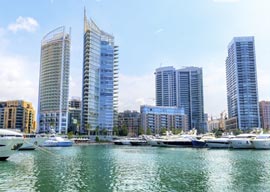
July 02, 2015

Zaitunay Bay, Beirut
Source: Shutterstock
I landed at Rafic Hariri Airport at five in the morning. Friends had asked if Beirut was dangerous. I wanted to see. Basra had surprised me in the war, it was pleasant around the fighting”bartering for ice, chatting with locals, playing football with the children. When it did get dangerous, and we British soldiers were being bombed in Basra in 2006, Christopher Hitchens took his son to northern Iraq and proved you could still be a tourist. I wanted to change my worldview. Outside the airport I haggled with a taxi driver who insisted on 45 dollars for 10 minutes. I offered him 20 and he took me to my hotel (later I found the fare was 10; if you go, stick to 10). I stayed at the Mayflower. The history reads that Kim Philby and Graham Greene stayed there.
Beirut is not what you expect if you’re coming for the war. There are the warnings from the British government not to get too close to the borders”sound advice. To the south is Israel, a closed border, where Hezbollah are in charge. Hezbollah and Israel are not what I expected either, both are respected and reviled by the Lebanese. Some say another fight with Israel is inevitable”and that may be. Reading Augustus Richard Norton’s (a former U.S. Army officer) history of Hezbollah shows a mutual respect between them and the Israeli Defense Forces, how they both view their actions as within the “rules of the game.” One man’s terrorist is only half the story. The Americans even took them off their terror threat list. My worldview was changing.
To the east, Lebanon borders Syria, where Hezbollah can claim many victories against ISIS. They’ve got the weapons and the experience. With the West largely standing by, they’ve taken the initiative. The Shia are fighting the Sunni from the west here in Lebanon, and from the east, the Iranian militias in Iraq. Maybe they’ll meet in Syria, maybe there’ll be a new Persian empire, maybe the maps will have to be redrawn. The subjugation of the Shia by the Sunni is uncoiling here. The local papers’ front pages do have war, but there’s another Beirut. You can look for the bullet holes of the civil war, go to where Rafic Hariri was assassinated (near the St. George Hotel on Valentine’s Day, 2005), but car bombings and assassinations are not all of what’s happened here. You can read Robert Fisk and find that Beirut. But there is another.
I stood on my balcony and heard the call to prayer. I’m not a religious man, but in that warm blue-lit sky it was something beautiful. I wanted to hear it. I walked along the Corniche from the American University for 20 minutes and found Zaitunay Bay with its yachts (the largest boasting a helicopter), the Beirut Souks, and the boutiques on the seafront where you’ll find Tom Ford (with the exchange rate a leather jacket from here will set you back 8.5 million Lebanese pounds). Nearby is the Mohammed Al-Amin Mosque in Martyrs’ Square, built by Hariri with stone from Saudi Arabia; he’s buried next to it. A short walk will take you into the Armenian quarter with its wall art declaring that the Turks are guilty of genocide. I was staying in Hamra, known for its intellectuals, where you can buy most newspapers you’d want”in Arabic, English, and French. A friend texted me and asked how it was going. Was it dangerous?
Normal, I told him, normal. The weather is incredible, the landscape beautiful, the food excellent, but it’s normal. The taxi drivers beeping at you for custom can be ignored after a bit. You should come here, I told him. Yes, there’s a war on one border and a closed border to the south, but the rest of Lebanon’s boundary is the Mediterranean Sea. And you’ll see the Ferraris, the pink Humvees, the luxury flats that would rival and embarrass any we have in London, the people sitting outside the Metropole with their cigars and Royal Oaks, the rich, the poor, and everybody in between”normal.